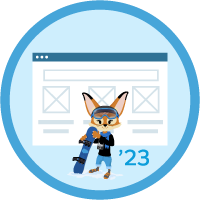Salesforce Architect Certification Maintenance (Winter '23)
→ Maintain Your Data Architect Certification for Winter '23
1. What is the most important step to enable Person Accounts without Salesforce Support?
A. Confirm each object has two record types.
B. Test the features in a sandbox.
C. Enable the features and review the org implications after.
D. Add read permission to all user profiles.
2. What is the new name for Salesforce CDP?
A. Cloud Data Platform
B. Content Delivery Platform
C. Customer Data Platform
D. Customer Audience 360
3. What type of list uses custom address fields to improve address data accuracy for your users?
A. State and Country/Territory Picklists
B. Authorized Address Lists
C. Address Filter Lists
D. Structured Data Lists
4. How can an event delivery allocation be made more efficient?
A. Validation rules
B. Filter expressions
C. Apex triggers
D. Formula filters
→ Maintain Your Dev. Lifecycle & Deployment Architect Certification for Winter '23
1. What must be created first in order to deploy content to an LWR site in stages?
A. New component
B. Inbound change set
C. Outbound change set
D. Aura template
2. What output is displayed when the Salesforce CLI package report command runs?
A. A list of Apex classes that aren’t passing code coverage requirements
B. A JSON report
C. A Package2Version object
D. A list of the highest code coverage percentages
3. What determines an org’s "shape" in Salesforce?
A. Developer, Group, Professional, Enterprise, and Unlimited Editions
B. License, limits, definitions, version, and features
C. Features, settings, edition, limits, and licenses
D. Platform, Domain, Package, Cloud, and Previews
4. When will API Versions 21.0 through 30.0 be retired?
A. Spring '23
B. Summer '22
C. Summer '23
D. Summer '24
5. During a major release preview, sandboxes are upgraded before production orgs. What is the typical lead time for sandbox upgrades vs. production orgs?
A. Six weeks
B. Six days
C. Eight weeks
D. Ten weeks
→ Maintain Your Identity & Access Architect Certification for Winter '23
1. Why does Salesforce recommend the OAuth 2.0 client credentials flow as a more secure alternative to the username-password flow?
A. An access token is exchanged for the consumer key and consumer secret.
B. The flow is free from explicit user interaction.
C. A third-party app can’t generate automated reports.
D. A and B
E. B and C
2. Salesforce now supports WebAuthn API security keys. Can a previously registered U2F key be used?
A. Yes, it will adopt WebAuthn APIs on first use.
B. Yes, if you memorize your master encryption key.
C. No.
D. Yes, if you trade in the U2F key for a new one.
3. With multi-factor authentication enabled, how long can you view a connected app’s consumer key and secret before a second identity challenge is required?
A. Fifteen minutes
B. Five minutes
C. Thirty minutes
D. Four minutes
4. Users can no longer log in to Salesforce using a username and password as URL query string parameters to the login URL. What action must users take if they see a redirect status code?
A. Authenticate by passing un= or pw=
B. Reinstall the Salesforce Mobile App
C. Change your login and authentication integrations
D. Disconnect all apps
5. Why does Salesforce recommend blocking use of the OAuth 2.0 username-password flow?
A. To help existing integrations
B. To prevent it from working with the Field Service mobile app
C. To keep developers from using it to build more integrations
D. To improve managed packages
6. When do new staged consumer values become valid?
A. When generated
B. When applied
C. When shared
D. When connected
→ Maintain Your Integration Architect Certification for Winter '23
1. What is the first step to connect a user flow screen to your org’s external data?
A. Generate pick list options.
B. Add a collection choice set to the appropriate component.
C. Create a collection choice set and reference an Apex-defined collection.
D. Generate new username-password combinations.
2. A custom channel can group messages from multiple platform events into one stream. What type of events are supported?
A. High-volume custom platform events
B. Standard platform events
C. Real-time monitored events
D. Legacy standard-volume custom platform events
3. What do community guest users require access to in order to run flows containing External Services actions?
A. Run Flows permission
B. The Login page for the Flow component
C. Experience Cloud External User profile
D. The flow in Experience Builder
4. How many programming languages are supported by Pub/Sub API?
A. Seven
B. Ten
C. Eleven
D. Thirteen
→ Maintain Your Sharing & Visibility Architect Certification for Winter '23
1. Where are external objects found when accessed from the Setup menu?
A. Object Manager
B. Most Recently Used
C. External Data Sources
D. A and C
E. B and C
2. What is the benefit of using a scoping rule instead of a restriction rule?
A. Scoping rules show a user all the records they have access to in the org sharing settings.
B. Scoping rules limit access to records the user can see.
C. Scoping rules control the default records that users see without limiting all access.
D. A and B
E. B and C
3. Why did Salesforce remove guest user assignments from permission sets associated with most permission set licenses?
A. To prevent guest users from being granted object permissions that aren’t required
B. To remove set license assignments automatically from guest users
C. To delete custom object permissions
D. To allow View All, Modify All, edit and delete permissions
4. Salesforce has added org-wide sharing settings for product records. What is recommended in order to test any changes in a sandbox?
A. Review sharing settings and defaults for internal and external users
B. Test the settings with all customizations
C. Set Product access to Private
D. A and then B
E. B and then C
5. What feature prevents external users from accessing other users’ personal information?
A. Personal Identifiable Information Screen
B. Enable Enhanced Personal Information Management
C. Conceal User Information
D. Custom Scoping Rules
Certification Maintenance Due Date:
December 8, 2023
Helpful link:
Winter '23 Certification Maintenance




















 ).
).
